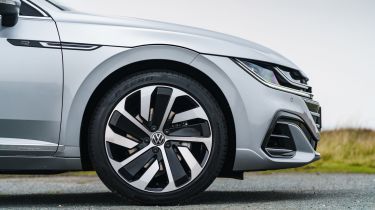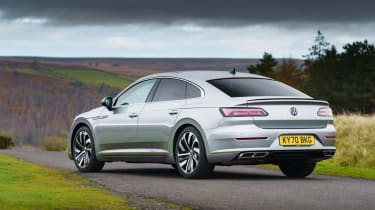Volkswagen Arteon (2017-2024)- Engines, performance and drive
Refined, comfortable and a great all-rounder, but don’t expect the Arteon to provide much in the way of driving thrills

Just so you know, this is an older review of the 2017-2024 Volkswagen Arteon. If you are interested in information about a used Volkswagen Arteon, or news about the latest Volkswagen models, please follow the links provided.
On the road, the Arteon is a little softer than its aggressive styling might suggest, but it really excels as a long-distance motorway cruiser. The Passat was already supremely efficient in this regard, and the extra cabin luxury and slippery body styling of the Arteon mean it’s even more comfortable, quiet and refined on long hauls.
If you want driving thrills, there’s no doubt a BMW 4 Series Gran Coupe provides a more responsive experience. The Arteon’s steering offers little road feel, and switching the DCC adaptive dampers to Sport mode reins in the body roll but at the noticeable expense of ride comfort.
We ended up leaving the DCC system in Comfort – which can occasionally feel floaty – or Normal, most of the time. This last setting works very well, with a decent balance between ride comfort and body control, but it’s an acknowledgement that being a good all-rounder is the Arteon’s strongest suit. When we pitted the Arteon face-to-face with the Audi A5 Sportback in a twin test, we found it narrowly offered a better driving experience, even though the noise levels were higher.
Engines, 0-60 acceleration and top speed
When it comes to powering the Arteon, there’s a fairly wide range of engines to choose from. Traditionalists will be pleased to hear that diesel power is still available, and this comes in the form of a 2.0-litre TDI. Depending on your chosen spec, this engine produces either 148bhp and 350Nm of torque or 197bhp and 400Nm.
Both diesels have a seven-speed DSG transmission fitted as standard, but you’ll need the more powerful unit if you want a 4MOTION four-wheel drive. The 148bhp diesel will propel the Arteon from 0-62mph in 9.3 seconds, while the 197bhp unit reduces this time to 7.9 seconds.
If you prefer petrol power, you have a choice of two engines. The smaller of the two is a 148bhp 1.5-litre TSI unit, which is only available with a six-speed manual gearbox. This manages the 0-62mph sprint in 9.0 seconds. Upgrading to the larger 187bhp 2.0-litre TSI changes the transmission to a seven-speed DSG automatic, and this combination results in a 7.9-second sprint.
A 1.4-litre plug-in hybrid caters for company car drivers. The Arteon eHybrid’s powertrain produces 215bhp and 250Nm of torque, so it packs a reasonable amount of punch with a 0-62mph time of 7.8 seconds. Along with improved fuel efficiency and lower emissions, the 13.0kWh battery also claims up to 37 miles of fully-electric range.
For those who crave outright performance, the 316bhp R performance model is rapid, with its 420Nm of torque helping it to 62mph from a standstill in 4.9 seconds and onto a top speed of 155mph.








